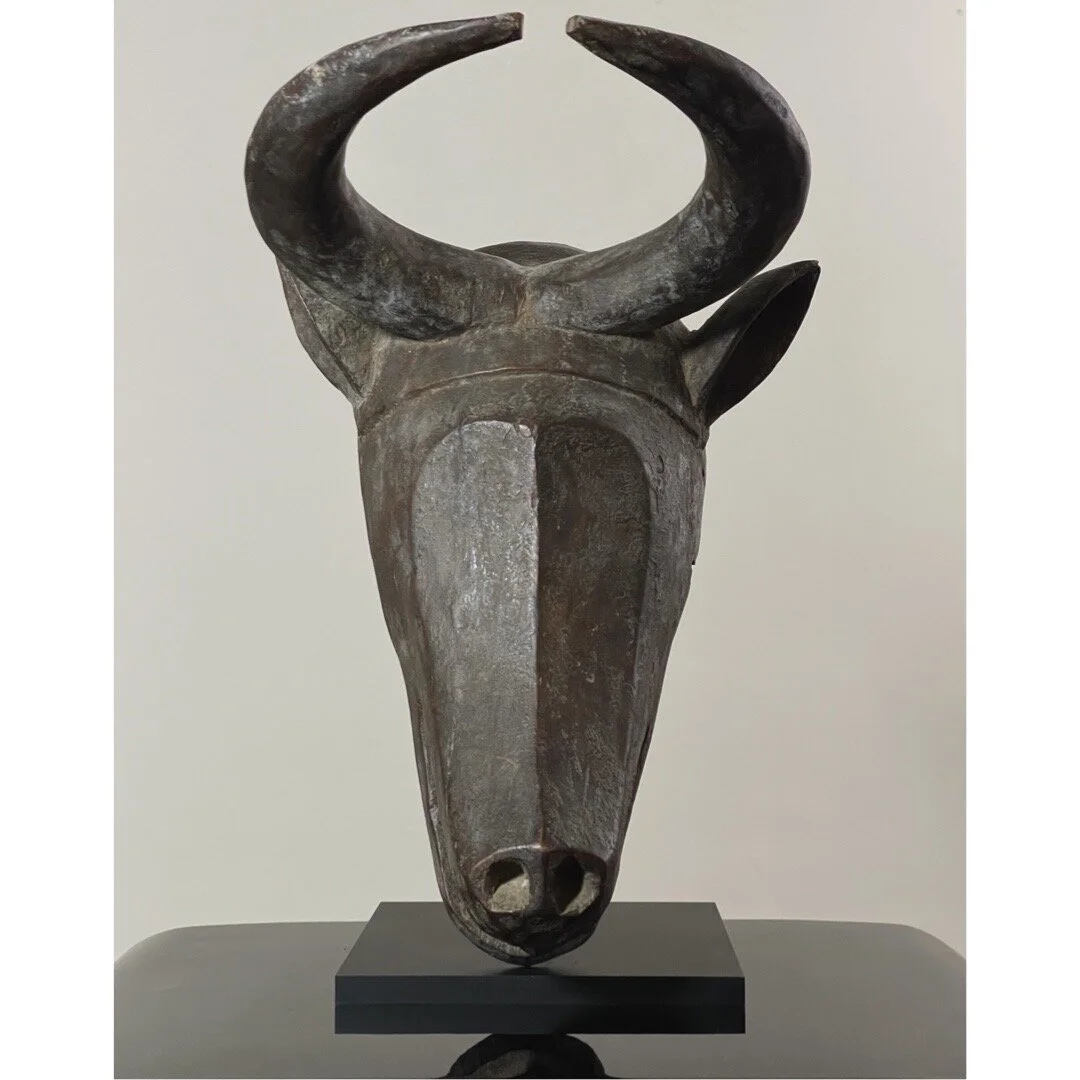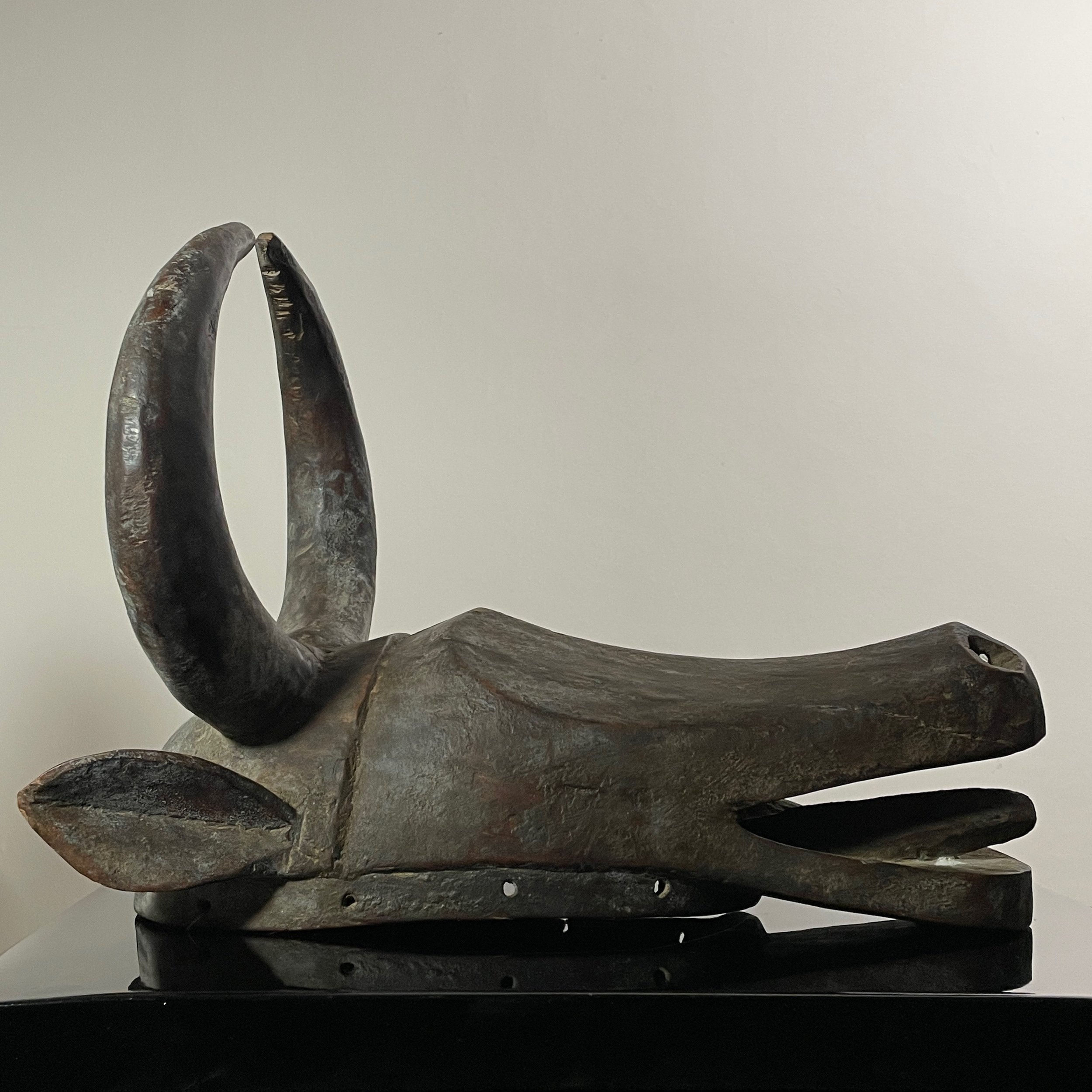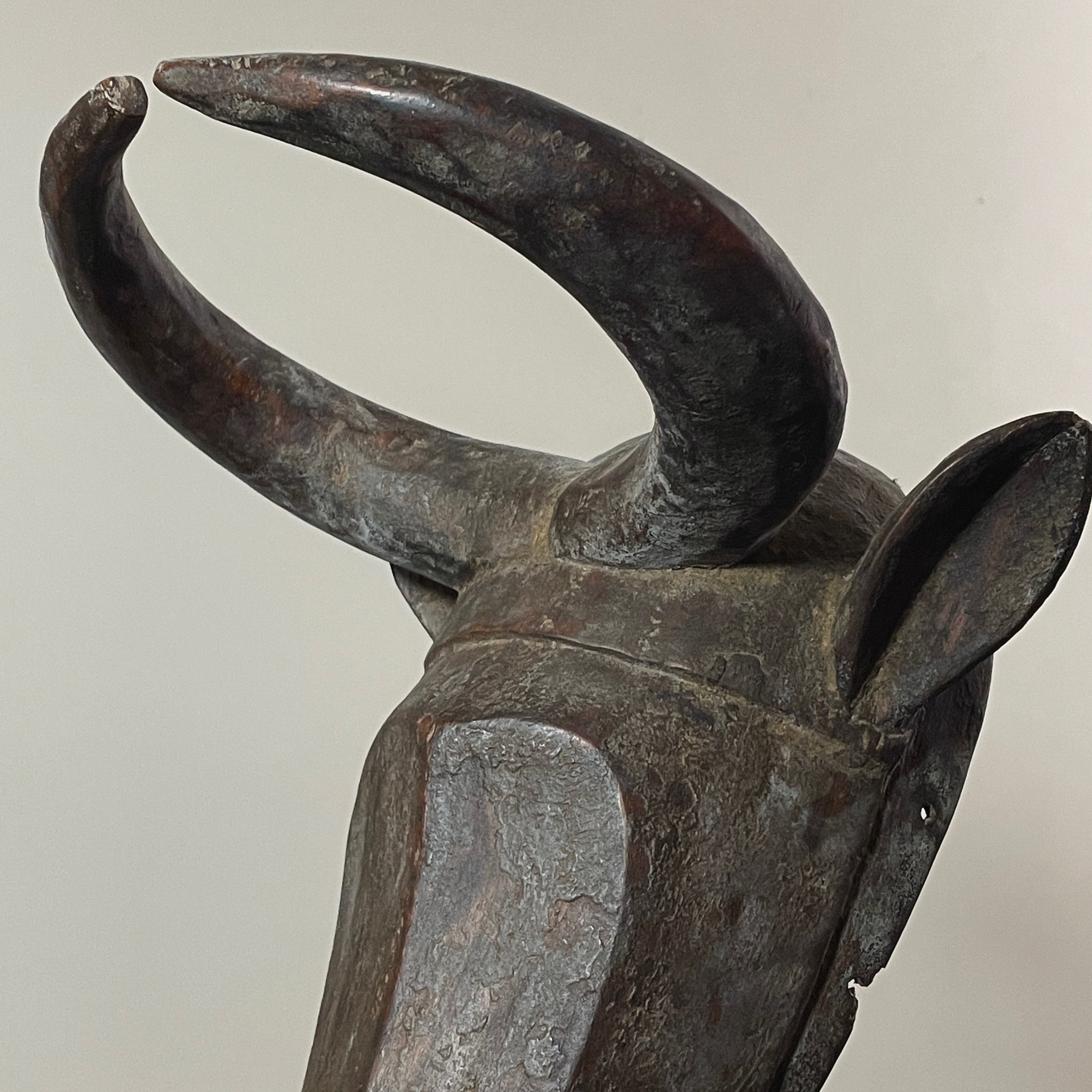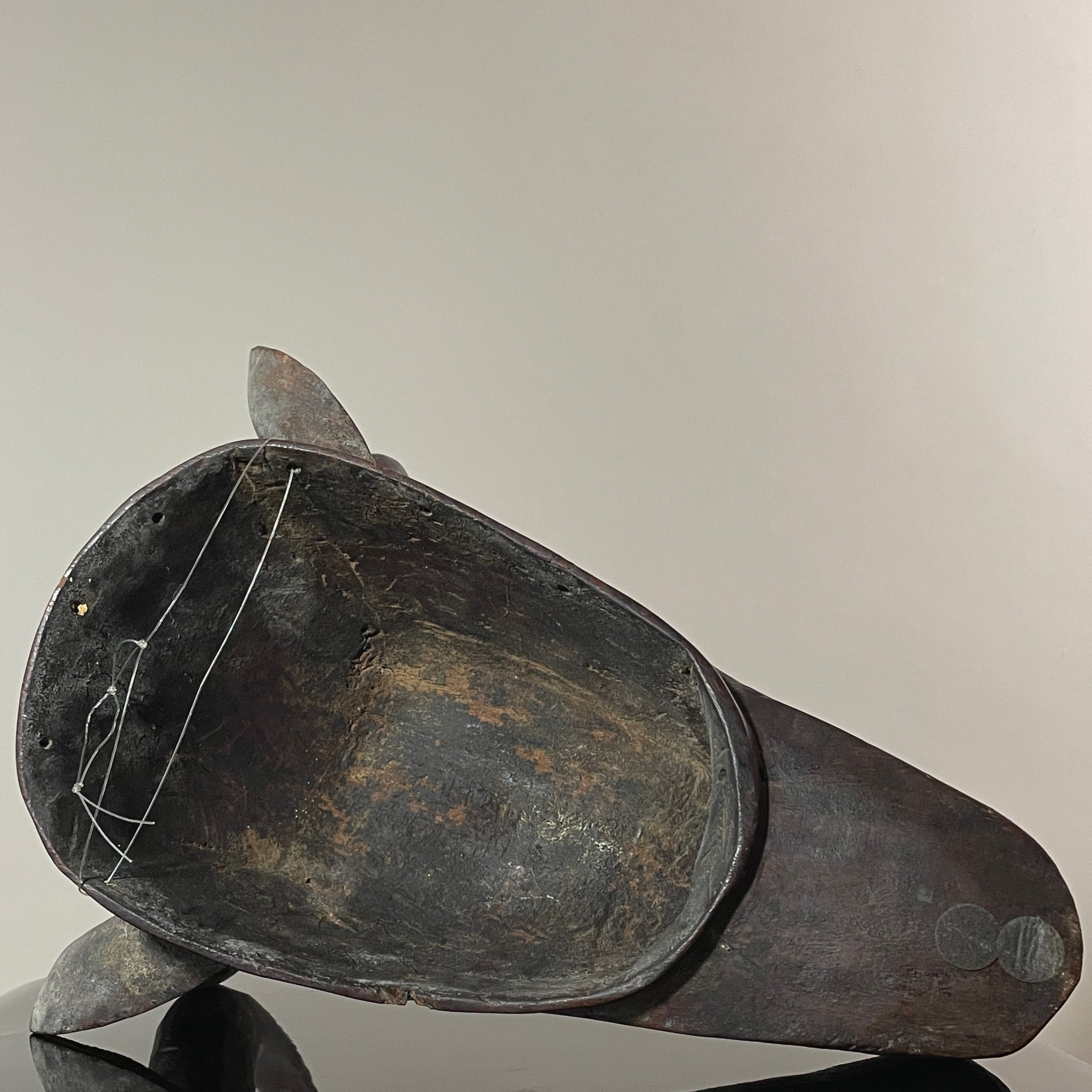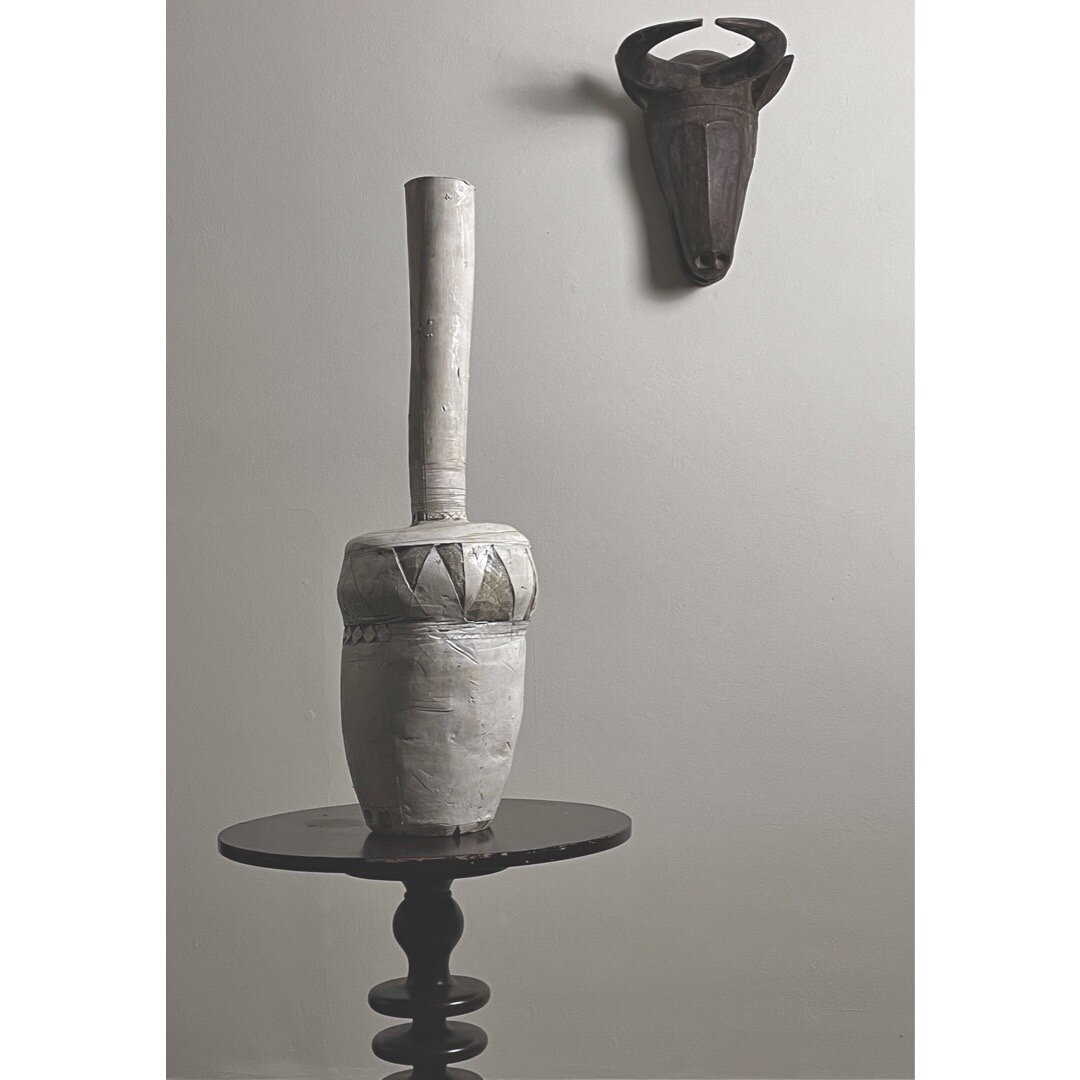Antique Late 19th Century Duala Hand Carved Cow Mask
Antique hand carved Duala (or Douala) cow mask. In good condition with wear consistent with age. Please refer to pictures for details. The stand is not included.
Size: 14.25”H x 10.5”W x 11'“D
The Duala (or Douala) are an ethnic group of Cameroon. They primarily inhabit the littoral region to the coast and form a portion of the Cameroonian coastal peoples. They have historically played a highly influential role in Cameroon due to the wealth gained over years as traders and land owners.The Duala today are divided into the urban and rural. Those who live in the cities, particularly Douala itself, earn a living at a number of skilled and unskilled professions. Many Duala still own parts of the city, allowing them to live off rents and development. The rural Duala, in contrast, work as fishermen and farmers, mostly at the subsistence level. Fishing is the trade of choice.Traditional Duala society was divided into three strata. At the top were the Wonja, native Duala, with full rights of land ownership. The next tier consisted of the Wajili, either non-Duala peoples or the descendants of slaves. Finally, the Wakomi, or slaves, made up the bottom rung. Chiefs and headmen sat at the pinnacle of this hierarchy in the past, though today such figures have very little power in their own right. Instead, such individuals are more likely to own property and to have inherited wealth. Councils of elders and secret societies allow communities to decide important issues.Ancestor worship is an important part of life, althpugh majority of the Duala are Christian. Duala believe that their ancestors live in the sea. In this worldview, demi-human water spirits known as Miengu (singular: Jengu) live in the waters and mediate between worshippers and God. Other, evil sprits live in the forests and the sea. Traditional festivals held each year serve as the most visible expression of these traditional beliefs in modern times.
Antique hand carved Duala (or Douala) cow mask. In good condition with wear consistent with age. Please refer to pictures for details. The stand is not included.
Size: 14.25”H x 10.5”W x 11'“D
The Duala (or Douala) are an ethnic group of Cameroon. They primarily inhabit the littoral region to the coast and form a portion of the Cameroonian coastal peoples. They have historically played a highly influential role in Cameroon due to the wealth gained over years as traders and land owners.The Duala today are divided into the urban and rural. Those who live in the cities, particularly Douala itself, earn a living at a number of skilled and unskilled professions. Many Duala still own parts of the city, allowing them to live off rents and development. The rural Duala, in contrast, work as fishermen and farmers, mostly at the subsistence level. Fishing is the trade of choice.Traditional Duala society was divided into three strata. At the top were the Wonja, native Duala, with full rights of land ownership. The next tier consisted of the Wajili, either non-Duala peoples or the descendants of slaves. Finally, the Wakomi, or slaves, made up the bottom rung. Chiefs and headmen sat at the pinnacle of this hierarchy in the past, though today such figures have very little power in their own right. Instead, such individuals are more likely to own property and to have inherited wealth. Councils of elders and secret societies allow communities to decide important issues.Ancestor worship is an important part of life, althpugh majority of the Duala are Christian. Duala believe that their ancestors live in the sea. In this worldview, demi-human water spirits known as Miengu (singular: Jengu) live in the waters and mediate between worshippers and God. Other, evil sprits live in the forests and the sea. Traditional festivals held each year serve as the most visible expression of these traditional beliefs in modern times.
Antique hand carved Duala (or Douala) cow mask. In good condition with wear consistent with age. Please refer to pictures for details. The stand is not included.
Size: 14.25”H x 10.5”W x 11'“D
The Duala (or Douala) are an ethnic group of Cameroon. They primarily inhabit the littoral region to the coast and form a portion of the Cameroonian coastal peoples. They have historically played a highly influential role in Cameroon due to the wealth gained over years as traders and land owners.The Duala today are divided into the urban and rural. Those who live in the cities, particularly Douala itself, earn a living at a number of skilled and unskilled professions. Many Duala still own parts of the city, allowing them to live off rents and development. The rural Duala, in contrast, work as fishermen and farmers, mostly at the subsistence level. Fishing is the trade of choice.Traditional Duala society was divided into three strata. At the top were the Wonja, native Duala, with full rights of land ownership. The next tier consisted of the Wajili, either non-Duala peoples or the descendants of slaves. Finally, the Wakomi, or slaves, made up the bottom rung. Chiefs and headmen sat at the pinnacle of this hierarchy in the past, though today such figures have very little power in their own right. Instead, such individuals are more likely to own property and to have inherited wealth. Councils of elders and secret societies allow communities to decide important issues.Ancestor worship is an important part of life, althpugh majority of the Duala are Christian. Duala believe that their ancestors live in the sea. In this worldview, demi-human water spirits known as Miengu (singular: Jengu) live in the waters and mediate between worshippers and God. Other, evil sprits live in the forests and the sea. Traditional festivals held each year serve as the most visible expression of these traditional beliefs in modern times.

